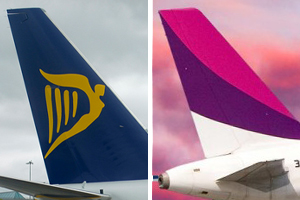In September, budget carriers Ryanair and Wizz Air reported notable increases in passenger numbers, showcasing strong performance at the end of the summer peak period.
Ryanair experienced a 10% growth, carrying 19.1 million passengers, while Wizz Air saw a nearly 4% rise, transporting 5.76 million passengers.
Ryanair experienced a significant rise in passenger numbers in September, with figures reaching 19.1 million. The airline achieved a load factor of 94%, indicating robust demand. Ryanair’s performance marked a successful conclusion to the summer peak travel period, operating more than 106,000 flights during the month.
The latest figures reflect an 8% increase in annual carryings for Ryanair, totalling 193.6 million passengers. This performance underscores the airline’s continued dominance in Europe. Meanwhile, Wizz Air reported a 3.9% year-on-year rise to carry 5.76 million passengers, achieving a load factor of 91.7%.
Wizz Air, the low-fares airline operating in eastern and central Europe, witnessed a 4.8% increase in capacity despite challenges. These included aircraft groundings due to Pratt & Whitney GTF engine-related issues. Wizz Air’s adaptive strategies allowed it to raise current quarter capacity by 1.2%.
As of the most recent quarter, Wizz Air’s capacity increased to 19.11 million seats. Year-to-date figures show a rise of 1.1% in carryings, totalling 17.90 million passengers. This growth, alongside adjustments in capacity, highlights the airline’s resilience in navigating operational challenges.
The growth trajectories of Ryanair and Wizz Air illustrate the dynamic nature of the European budget airline market. These carriers are capitalising on strong demand and efficient operational models to expand their market share. Analysts predict continued growth, driven by increasing consumer preference for low-cost travel options.
Despite engine-related setbacks, Wizz Air’s ability to increase capacity underscores its operational flexibility. Such adaptability is critical in the highly competitive airline industry, where external factors can significantly impact performance. Effective management and strategic planning are essential for sustaining growth.
Ryanair’s CEO stated, ‘Our performance this September reflects our commitment to providing affordable travel without compromising on service.’ Similarly, a Wizz Air spokesperson commented, ‘Despite challenges, our growth demonstrates our ability to adapt and meet passenger demand effectively.’
The reported rise in passenger carryings by Ryanair and Wizz Air signals a positive trend in the budget airline industry. Continued growth and adaptation will be key as these airlines navigate the post-pandemic travel landscape and strive to meet evolving consumer preferences.
The substantial increases in passenger numbers for both Ryanair and Wizz Air highlight the robust demand within the budget airline sector.
As these carriers continue to adapt and expand, their growth trajectories suggest a positive outlook for the industry, benefiting travellers seeking cost-effective options.

